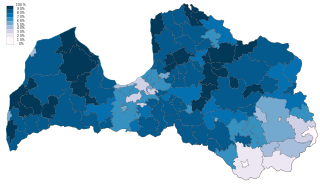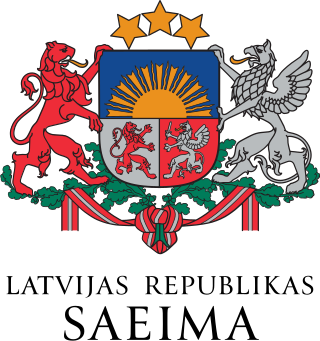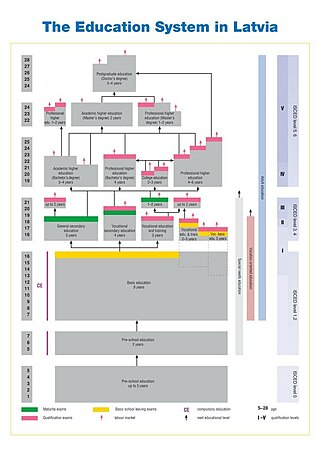
The Balts or Baltic peoples are an ethno-linguistic group of peoples who speak the Baltic languages of the Balto-Slavic branch of the Indo-European languages.

Latvia, officially the Republic of Latvia, is a country in the Baltic region of Northern Europe. It is one of the Baltic states; and is bordered by Estonia to the north, Lithuania to the south, Russia to the east, Belarus to the southeast, and shares a maritime border with Sweden to the west. Latvia covers an area of 64,589 km2 (24,938 sq mi), with a population of 1.9 million. The country has a temperate seasonal climate. Its capital and largest city is Riga. Latvians belong to the ethno-linguistic group of the Balts and speak Latvian, one of the only two surviving Baltic languages. Russians are the most prominent minority in the country, at almost a quarter of the population.

Demographic features of the population of the historical territory of Latvia include population density, ethnic background, education level, health of the populace, economic status, religious affiliations and other aspects of the population.

The Latvian language, also known as Lettish, is an Eastern Baltic language belonging to the Baltic branch of the Indo-European language family, spoken in the Baltic region. It is the language of Latvians and the official language of Latvia as well as one of the official languages of the European Union. There are about 1.2 million native Latvian speakers in Latvia and 100,000 abroad. Altogether, 2 million, or 80% of the population of Latvia, spoke Latvian in the 2000s, before the total number of inhabitants of Latvia slipped to less than 1.9 million in 2022. Of those, around 1.16 million or 62% of Latvia's population used it as their primary language at home, though excluding the Latgale region it is spoken as a native language in villages and towns by over 90% of the population.

The northern region of Europe has several definitions. A restrictive definition may describe Northern Europe as being roughly north of the southern coast of the Baltic Sea, which is about 54°N, or may be based on other geographical factors such as climate and ecology.

The Baltic states or the Baltic countries is a geopolitical term, which currently is used to group three countries: Estonia, Latvia, and Lithuania. All three countries are members of NATO, the European Union, the Eurozone, and the OECD. The three sovereign states on the eastern coast of the Baltic Sea are sometimes referred to as the "Baltic nations", less often and in historical circumstances also as the "Baltic republics", the "Baltic lands", or simply the Baltics.

The Livonian language is a Finnic language whose native land is the Livonian Coast of the Gulf of Livonia, located in the north of the Kurzeme peninsula in Latvia. Although its last native speaker died in 2013, there are about 40 reported L2 speakers and 210 having reported some knowledge of the language. Possibly uniquely among the Uralic languages, Livonian has been described as a pitch-accent language.

Latvians are a Baltic ethnic group and nation native to Latvia and the immediate geographical region, the Baltics. They are occasionally also referred to as Letts, especially in older bibliography. Latvians share a common Latvian language, culture, history and ancestry.

The prime minister of Latvia is the most powerful member of the Government of Latvia, who presides over the Latvian Cabinet of Ministers. The officeholder is nominated by the president of Latvia, but must be able to obtain the support of a parliamentary majority in the Saeima.

The Saeima is the parliament of the Republic of Latvia. It is a unicameral parliament consisting of 100 members who are elected by proportional representation, with seats allocated to political parties which gain at least 5% of the popular vote. Elections are scheduled to be held once every four years, normally on the first Saturday of October. The most recent elections were held in October 2022.

Russification, or Russianization, is a form of cultural assimilation in which non-Russians, whether involuntarily or voluntarily, give up their culture and language in favor of the Russian culture and the Russian language.

Latgale, also known as Latgalia is one of the Historical Latvian Lands. It is the easternmost region and is north of the Daugava River. While most of Latvia is historically Lutheran, Latgale is predominantly Roman Catholic: 65.3% according to a 2011 survey. After the Counter-Reformation it was the northernmost predominantly Catholic province or region in Europe. There is a considerable Eastern Orthodox minority (23.8%), of which 13.8% are Russian Orthodox Christians and 10.0% are Old Believers. As of 2020, the region's population was 255,968.

The Livonians, or Livs, are a Balto-Finnic people indigenous to northern and northwestern Latvia. Livonians historically spoke Livonian, a Uralic language closely related to Estonian and Finnish. The last person to have learned and spoken Livonian as a mother tongue, Grizelda Kristiņa, died in 2013, making Livonian a dormant language. As of 2010, there were approximately 30 people who had learned it as a second language.

Latgalian is a Latvian language dialect, mostly spoken in Latgale, the eastern part of Latvia. Its standardized form is recognized and protected as a "historical language of Latvia" (vēsturiska valoda Latvijā) under national law. The 2011 Latvian census established that 8.8% of Latvia's inhabitants, or 164,500 people, speak Latgalian daily. 97,600 of them live in Latgale, 29,400 in Riga and 14,400 in the Riga Planning Region.

Articles 4 and 114 of the Constitution of Latvia form the foundation for language policy in Latvia, declaring Latvian to be the official state language and affirming the rights of ethnic minorities to preserve and develop their languages. Livonian language is recognized as "the language of the indigenous (autochthon) population" in the Official Language Law, but Latgalian written language is protected as "a historic variant of Latvian." All other languages are considered foreign by the Law on State Language. Latvia provides national minority education programmes in Russian, Polish, Hebrew, Ukrainian, Estonian, Lithuanian, and Belarusian.

Education in Latvia is free and compulsory. Compulsory education includes two years of preschool education and a further nine years of primary education.

Latvijas Radio is Latvia's national public-service radio broadcasting network. It began broadcasting on 1 November 1925, and has its headquarters in the Latvian capital, Riga. Latvijas Radio broadcasts six different channels in the FM band as well as via the internet: Latvijas Radio 1, Latvijas Radio 2, Latvijas Radio 3 – Klasika, Latvijas Radio 4 – Doma laukums, Latvijas Radio 5 – Pieci.lv, and Latvijas Radio 6 – Radio NABA.
Latvian Sign Language is a sign language commonly used by deaf people in Latvia. Linguists use LSL as an acronym for Latvian Sign Language.
For the Native language! was a political party in Latvia. The party's leader was Vladimir Linderman.
Nicktoons is a European international pay television network operated by Paramount Networks EMEAA. Launched on 1 February 2017, international version of the American TV channel Nicktoons, the network serves many of the countries in the European Union, and features several feeds differentiated by time zones and local languages being the primary audio feed offered, with other languages offered through second audio program options. Other networks may display the domestic language as open-access subtitles.
















